Related Research Articles

Abraham Joshua Heschel was a Polish-American rabbi and one of the leading Jewish theologians and Jewish philosophers of the 20th century. Heschel, a professor of Jewish mysticism at the Jewish Theological Seminary of America, authored a number of widely read books on Jewish philosophy and was a leader in the civil rights movement.
Christianity began as a movement within Second Temple Judaism, but the two religions gradually diverged over the first few centuries of the Christian Era. Today, differences of opinion vary between denominations in both religions, but the most important distinction is Christian acceptance and Jewish non-acceptance of Jesus as the Messiah prophesied in the Hebrew Bible and Jewish tradition. Early Christianity distinguished itself by determining that observance of halakha was not necessary for non-Jewish converts to Christianity. Another major difference is the two religions' conceptions of God. The Christian God consists of three persons of one essence, with the doctrine of the incarnation of the Son in Jesus being of special importance. Judaism emphasizes the Oneness of God and rejects the Christian concept of God in human form. While Christianity recognizes the Hebrew Bible as part of its scriptural canon, Judaism does not recognize the Christian New Testament.

Jacob Neusner was an American academic scholar of Judaism. He was named as one of the most published authors in history, having written or edited more than 900 books.

Reform Judaism, also known as Liberal Judaism or Progressive Judaism, is a major Jewish denomination that emphasizes the evolving nature of Judaism, the superiority of its ethical aspects to its ceremonial ones, and belief in a continuous revelation which is closely intertwined with human reason and not limited to the theophany at Mount Sinai. A highly liberal strand of Judaism, it is characterized by little stress on ritual and personal observance, regarding Jewish law as non-binding and the individual Jew as autonomous, and by a great openness to external influences and progressive values.

The Jewish Theological Seminary (JTS) is a Conservative Jewish education organization in New York City, New York. It is one of the academic and spiritual centers of Conservative Judaism and a center for academic scholarship in Jewish studies. The Jewish Theological Seminary Library is one of the most significant collections of Judaica in the world.

Messianic Judaism is a modernist and syncretic sect that considers itself Jewish. Many consider it a part of the Christian movement of evangelicalism.

Yeshiva Rabbi Chaim Berlin or Yeshivas Rabbeinu Chaim Berlin is an American Haredi Lithuanian-type boys' and men's yeshiva in Brooklyn, New York.

The Hebrew Union College – Jewish Institute of Religion is a Jewish seminary with three locations in the United States and one location in Jerusalem. It is the oldest extant Jewish seminary in the Americas and the main seminary for training rabbis, cantors, educators and communal workers in Reform Judaism. HUC-JIR has campuses in Cincinnati, Ohio, New York City, Los Angeles, and Jerusalem. The Jerusalem campus is the only seminary in Israel for training Reform Jewish clergy.

Israel Jacobson was a German-Jewish philanthropist and communal organiser. Jacobson pioneered political, educational and religious reforms in the early days of Jewish emancipation, and while he lacked a systematic religious approach, he is also considered one of the heralds of Reform Judaism.
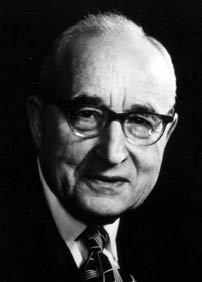
Jacob Rader Marcus was a scholar of Jewish history and a Reform rabbi.
Lekha Dodi is a Hebrew-language Jewish liturgical song recited Friday at dusk, usually at sundown, in synagogue to welcome the Sabbath prior to the evening services. It is part of Kabbalat Shabbat.

Reform Judaism, formally the Movement for Reform Judaism (MRJ) and known as Reform Synagogues of Great Britain until 2005, is one of the two World Union for Progressive Judaism–affiliated denominations in the United Kingdom. Reform is relatively traditional in comparison with its smaller counterpart, Liberal Judaism, though it does not regard Jewish law as binding. As of 2010, it was the second-largest Jewish religious group in the United Kingdom, with 19.4% of synagogue-member households. On 17 April 2023, Reform Judaism and Liberal Judaism announced their intention to merge as one single unified progressive Jewish movement. The new movement, which may be called Progressive Judaism, will represent about 30% of British Jewry who are affiliated to synagogues.

The Jewish Theological Seminary of Breslau was an institution in Breslau for the training of rabbis, founded under the will of Jonah Fränckel, and opened in 1854. It was the first modern rabbinical seminary in Central Europe, an academic precursor to today’s Conservative movement, and a center of Wissenschaft des Judentums. The seminary, at what is now an empty building plot in 14-18 Wlodkowica Street, was closed in 1938 by Nazi Party officials after the Kristallnacht.

Shemtob Gaguin(e) (5 September 1884 – 30 July 1953) was a British Sephardic rabbi and scion of a famous Moroccan rabbinical dynasty which emigrated to Palestine from Spain at the time of the Inquisition.
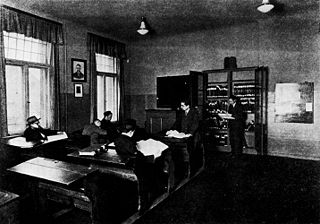
The Hildesheimer Rabbinical Seminary was founded in Berlin on 22 October 1873 by Rabbi Dr. Israel Hildesheimer for the training of rabbis in the tradition of Orthodox Judaism.
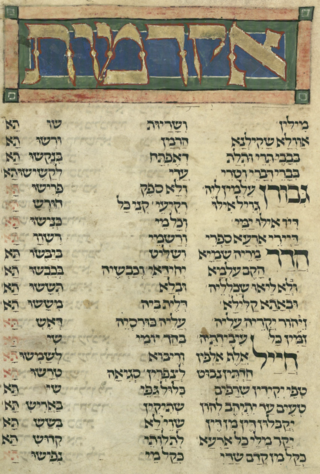
Akdamut, or Akdamus or Akdamut Milin, or Akdomus Milin, is a prominent piyyut written in Aramaic recited annually on the Jewish holiday of Shavuot by Ashkenazi Jews. It was penned by Rabbi Meir bar Yitzchak of Orléans, who was a cantor in Worms, Germany,. Akdamut consists of praise for God, His Torah, and His people.
Ruth Langer is a Professor of Theology at Boston College, and an expert on Jewish Liturgy and on Christian Jewish Relations. She is married to Jonathan Sarna.
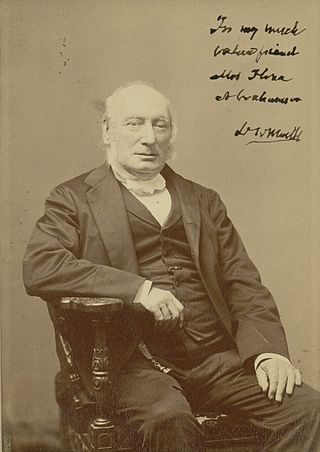
David Woolf Marks was a British Hebrew scholar and minister. He was the first religious leader of the West London Synagogue, which seceded from the authority of the Chief Rabbi, where he advocated a quasi-Karaite philosophy.
Rabbi John Desmond Rayner was a British Liberal Jewish rabbi. He was born in Berlin as Hans Sigismund Rahmer. He left Berlin in 1939 on one of the last Kindertransports. The Kindertransport programme brought around 10,000 children to the UK. Both his parents, Ferdinand Rahmer and Charlotte Landshut, were murdered in the Holocaust.
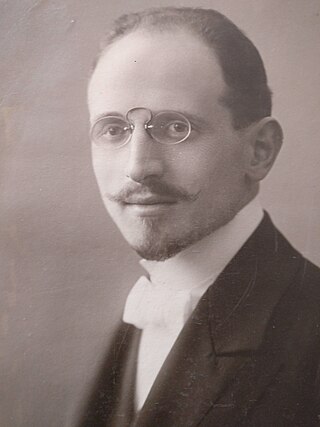
Arthur Löwenstamm was a Jewish theologian, writer and rabbi in Berlin and in London, where he came in 1939 as a refugee from Nazi Germany.